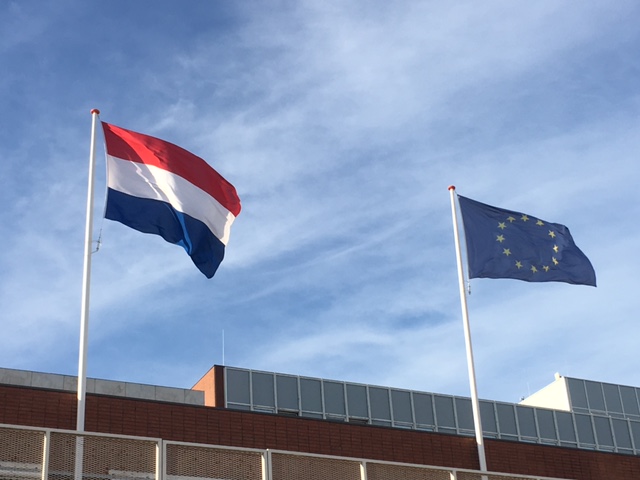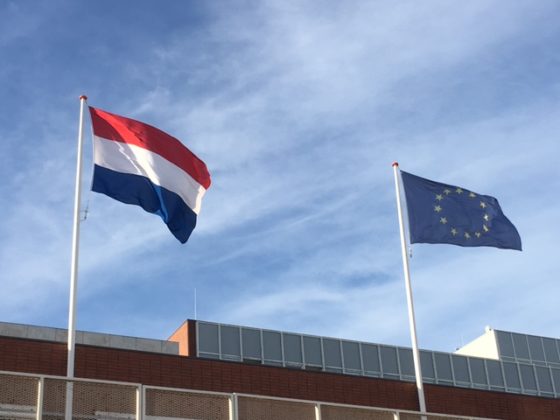The Dutch need to stand their ground in Europe


The coronavirus crisis is generating orgies of spending all over the world, including and particularly in Europe. Brussels is only too keen to get in on the act. It’s time the Dutch do what the Danes do, says columnist Syp Wynia.
As other crises have shown, the cry of ‘the end of Europe’ is sure to end in more ‘Europe’ and more money and power for the offices and meeting rooms of Brussels, Frankfurt, Luxembourg and Strasbourg.
Angela Merkel, who dropped her objection to Eurobonds in her and Emmanuel Macron’s €500bn recovery fund plan, is clearly intent on making the second half of 2020 a German-European celebration, featuring more spending, more migration and more climate related measures, together with her compatriot and fellow party member Ursula van der Leyen.
This is the one party that she doesn’t want to be spoiled by accusations of tightfistedness from the French and Mediterranean countries. She is, reportedly, also on her last term as chancellor so does not have to face the voters in person.
In any case, the floodgates in Brussel are opening and this time it is the combination of the euro crisis, the climate crisis and the coronavirus crisis that is boosting the centralisation of financial and political power.
Financial flows
EU financial flows are labyrinthine and immense. The European Central bank has bought €2,666bn worth of governments bonds over the last few years and initiated another round of loan buying worth €750bn this spring. The European Commission wants to considerably increase the budget for the next seven years – currently some €1,000bn – even after the departure of net contributor Britain.
The Commission’s ‘Green Deal’ will cost some €1,000bn. At the end of April eurozone countries earmarked €540bn in support of health care, mainly in Italy and Spain (which have not as yet appealed to the fund). It also upped Merkel and Macron’s recovery plan to €750bn while some in the European parliament talk of increasing it to €2,000bn.
Meanwhile what of the Netherlands? Just when prime minister Mark Rutte was doing so well European leaders have taken to calling him ‘childish’ (Merkel) or even ‘repulsive’ (Macron). The darling of Brussels has alienated his greatest fans and in the southern European countries his name, and that of his finance minister Wopke Hoekstra, is mud.
Why? Because they prefer loans and conditions to gifts and because they are against European government debt and European taxes. This is being seen by critics as a lack of solidarity and ungenerous.
But just how ungenerous is the Netherlands? The Dutch are the biggest net contributors to Europe per capita. In 2018 the Netherlands paid €6.7bn into the Brussels coffers and got €1.2bn in subsidies in return – according to figures from the Dutch Court of Audit.
Banking union
It has also, albeit reluctantly, paid its share of the loans to (particularly) Greece, loans which because of low interest rates and long terms are effectively gifts anyway. It also supports (with some enthusiasm) the formation of a European banking union which means Northern Europe will once again act as guarantor to southern European banks.
As the Dutch no vote to a European constitution in 2005 showed, the Dutch people’s support for the hungry caterpillar that is Brussels is wavering. There currently no majority for a ‘Nexit’ but there is no broad support for ‘more Europe’ although it is coming closer with every crisis.
This reluctance is illustrated by the 2017 coalition which states that the Netherlands will not promote the formation of a transfer union and a broadly carried motion against greater European expenditure.
Brussels knows this of course, and that is why it sent an emissary – director-general Gert-Jan Koopman, a member of the Dutch Labour party – to tell the Dutch to stop moaning. Meanwhile D66 leader Rob Jetten has taken on the role of EU ambassador in The Hague.
Their argument is that it doesn’t pay to block the will of the EU. The Netherlands may contribute more than it gets back in subsidies but it also benefits from the internal market. By supporting the Italian economy, they say, the Dutch are enabling the Italians to buy Dutch flowers.
Fairy tale
But that advantage is a Brussels fairy tale. Border controls and tariffs are expensive but removing them does not automatically mean profit. The fact that Dutch taxpayers have to pay billions so Italians can buy Dutch flowers worth millions is hardly a good earning model.
The intelligent variant of Jetten’s flowers is that the Dutch are profiting from stability, including on the financial markets and that the flow of money to Italy is the price we have to pay. Italy, its supporters say, has not profited economically from the euro as it is.
The hidden flaw in this argument is that Italy is not comfortable with the euro. It has low labour productivity and its competitiveness in the euro zone is weak. Italy is unable to compete with Germany and cannot devaluate its currency to compensate like it used to.
The European answer is, and has been for the last 10 years, to pump more money into the Italian economy. And now the same is happening with the corona bonds (or whatever they are called).
But if the euro is not suited to Italy then the country had better find an alternative. That would be better for everyone. But if Italy, supported by France and Germany, systematically goes a different way, the time may come when Northern European countries find their own alternatives.
Justice
For Britain it meant leaving the EU. For Ireland, Sweden and Denmark the alternative has been to bargain for exemptions, for instance of free movement or immigration policy. Despite dire warnings, it has not had any harmful effects on any of these countries. Their populations support them.
This is the way things are going in the Netherlands. If Dutch politicians want to do justice to their own democracy and the interests of the Dutch, then the moment has come to stop saying ‘no’ and doing ‘yes’ and to find an alternative of their own.
That is not to say the Netherlands should quit the EU or even quit the euro. But to be continually outvoted by others who want something from you, and to be left standing by Germany again and again, should prompt the government to consider its position.
This is an abridged version of a longer column which appeared on Wynia’s Week.
Thank you for donating to DutchNews.nl.
We could not provide the Dutch News service, and keep it free of charge, without the generous support of our readers. Your donations allow us to report on issues you tell us matter, and provide you with a summary of the most important Dutch news each day.
Make a donation